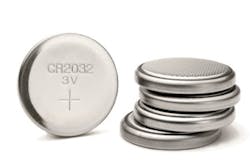Every year in the United States almost 4,000 children are hospitalized after swallowing the flat, round batteries that are used in toys, watches and other household objects.
So is there anything that manufacturers can do to make button batteries safer and prevent such injuries? Researchers at MIT, Brigham and Women's Hospital, and Massachusetts General Hospital believe so.
They have found that coating the batteries with a special material during the manufacturing process prevents them from conducting electricity after being swallowed. Animal tests have shown that such batteries did not damage the gastrointestinal tract at all.
The material they used was quantum tunneling composite (QTC), an off-the-shelf material which is commonly used in computer keyboards and touch screens.
QTC is capable of switching from an insulator to a conductor, depending on how much pressure it is under. The researchers calculated the maximum amount of pressure the battery would experience inside the digestive tract and verified that the coating would protect against tissue damage in the event that a coated battery is swallowed.
According to a report by MIT on the new development, the researchers are now working on developing a scalable method for manufacturing coated batteries and are seeking companies that would be interesting in adopting them. They believe that because QTC is relatively inexpensive and is already used in other consumer products, battery manufacturers could implement this type of coating quite easily.
A further potential benefit of the coating is the fact that it is waterproof, so it could be used to make batteries weather-resistant and more suitable for outdoor use.
